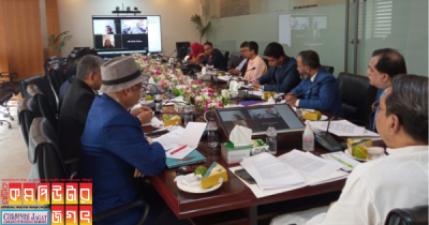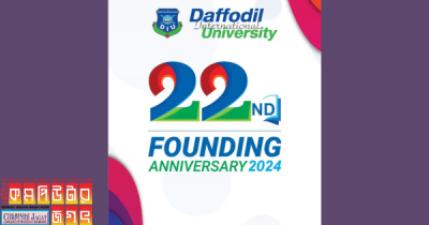Digital Bangladesh to build a knowledge-based society
The term ‘Digital Bangladesh’ has created renewed interest in government and commercial organizations in utilizing Information & Communication Technology (ICT) in governance and service delivery. In the light of the lesson learnt from our past ventures in establishing e-government the definition of Digital Bangladesh must be clearly understood. In my opinion the Digital Bangladesh comprises e-governance and service delivery through utilizing ICT but the vision of Digital Bangladesh encompasses much more than this. In order to make the vision successful the whole concept needs a strong knowledge creation and management.
The government and the organizations have invested heavily on technologies and overseas consultancies to realize the potential of the promised e-governance and e-services, transparency, profitability etc. But unfortunately we all have learn that : Technology alone won’t fix or alleviate a business problem and nor publicizing it guarantees its success. It is important to understand that Knowledge Management is often facilitated by ICT, technology by itself is not Knowledge Management.
The vision of Digital Bangladesh in order to be successful and sustainable is dependent on the development of indigenous capability to plan, design, build, monitor and manage national projects.
The whole issue can be represented through a three tier model. The top tier being the knowledge center which will provide research and create technology and solution, the 2nd tier is the Consultancy Service providers who will provide specification and supervise implementation and document all activities for the knowledge center, and the 3rd tier is the various manufacturing and service industry who will supply service and commodities. The academia, research institution etc provide knowledge to the knowledge centers in particular and the other tiers in general. This allows the 3rd tier to incorporate all available knowledge in the service arena. This will create partnership between all stake holders and the whole success of the partnership between key players will be dependent on the value of the knowledge created in the knowledge centers and their effective dissemination by the players in other layers. Currently the absence of any knowledge centers the whole development activities are centered on procurement of services and commodities from overseas. This has resulted in total dependency on overseas supplier for the survival of the development and productivity of the nation. We all should remember that development of electoral roll and national ID card along with the biometric verification implemented on indigenous capability has saved the country from potential huge expenditure on the contrary has created opportunity for earning substantial foreign exchange through export of service.
To create ownership of the Digital Bangladesh within the general public it should focus in promoting the following broad areas: Education, Health, Agriculture and Entrepreneurship.
Governance (enhancing citizens’ participation and promoting accountability, transparency and efficiency in governance process).
Activity within those areas will take place predominantly via a limited number of flagship initiatives & partnership, advocacy and expanding community expertise.
Flagship Initiatives & Partnership
In order to leverage joint resources and to spur visible action across the focused areas flagship initiatives will require several stakeholders’ partnership through alliance through public-private partnership. The partnership will be responsible for implementing in collaboration to produce concrete and measurable deliverables. The initiatives are expected to set targets within a short term (two to three years) timeframe based on current reliable baseline data taking into account existing targets including the committed goals set in the millennium development goal and national Poverty Reduction Strategy Paper document. The following areas may be considered for improving visible national indexes and promote education, entrepreneurship and draw foreign investment.
Better Connectivity with Broadband
A key enabler of the priority areas in today’s world is communication. To improve the local accessibility to information the initiative will have to put effort to accelerate the roll-out of communication infrastructures and increase broadband access across the country. ICT infrastructure is essential to achieve regional integration and enable poor people to participate in markets and help reduce poverty. Economic growth will depend upon widespread access to ICT services which in turn provide access to local, national, regional and global markets. Therefore, national and regional backbones, cross-border links, and rural connectivity need to be expanded in parallel with the deployment of applications to advantage of connectivity for productive use.
Bangladesh along with India, Nepal and Bhutan has undertaken a project through ADB’s efforts to support sub regional cooperation in eastern South Asia stems from the constitution of the South Asia Growth Quadrangle (SAGQ) by the Foreign Ministers of Bangladesh, Bhutan, India and Nepal (BBIN). The Ninth Summit of the South Asian Association for Regional Cooperation (SAARC) on May 1997 in Male had endorsed SAGQ as a sub regional initiative under SAARC. The SASEC Information Highway Project aims to connect SASEC countries more efficiently and effectively each other by broadband and bring the much needed social goods to communities in South Asia, especially to often underserve d rural areas. The deployment of ICT network under this program can be accelerated to bring the benefits of e-health, e-education, e-agriculture, e-trade etc to the rural community and bring harness regional cooperation to harness the potential of ICT.
Telecenter and Community e-Center
Bangladesh Telecenter Network has established number of telecenters and Community e-Center (CeC) across the country. The aim of these telecenters is to provide local language content for the users besides serving as access centers and e-services center. Telecenters and Community e-Centers will also be established under SASEC program. Telecenters can be one of the major thrust to provide various services along with health, agriculture education related services.
Free Access for all Schools to Net
The revolutionary developments and communication technologies such as Wimax has new opportunity to connect the schools and educational institutions to internet. This will help create a new generation of innovative citizens who will have the skills to be part of global knowledge society. However till date no effective measures have been taken in Bangladesh to connect schools to the Net. This technology also has the potential to raise connectivity within the country rapidly and at lesser cost and complexity of wiring the whole country.
ICT Professional Skill Assessment and Enhancement Program
This is an indigenous thought out program of the academia, industry and the government to enhance professional capacity of the knowledge and ICT workforce of the nation.
Telecenter & CeC, free access for all schools and educational institutions and ICT Professional Skill Assessment and Enhancement Program will help in expanding community expertise.
Media Strategy, Advocacy and Outreach
The effectiveness and impact of the Digital Bangladesh depend critically on its ability to protect its activities and achievements, generate interest and goodwill and secure continued financial support. Evaluation of ICT development using internationally recognized indicators and utilizing all mode of service delivery and information dissemination such as radio, tv, cell phone and telecenter & CeC.
Meaning of Digital Bangladesh
The idea of Digital Bangladesh will be centered on many more activities by the stake holders for delivering services but building an indigenous knowledge base will be an important issue of building a sustainable Digital Bangladesh. The basic goals for Digital Bangladesh should center on:
A reliable, secure broadband infrastructure throughout the nation with access for every Bangladeshi from their homes, work places, schools or telecenter or CeC;
A digitally literate population and workforce;
A digitally enabled nation, providing e-government information and service at national, regional levels;
Digital business development with intensified use of Internet in business and e-commerce to leverage productivity in the manufacturing and service sector;
A critical mass of internationally competitive information and communication technology human capacity and business; and
A legal framework that assures freedom of expression, democracy, transparency and access to knowledge and culture, while protecting the rights of creators and innovators towards building indigenous knowledge and technological base.







.png)






০ টি মন্তব্য